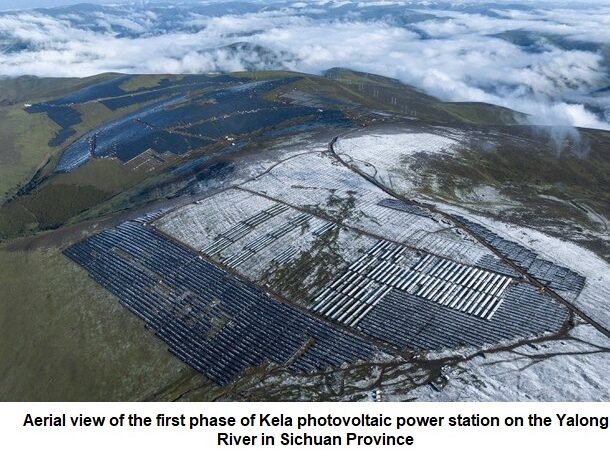China denies compensation for Tibetans displaced by world’s largest hydro-solar plant

The Chinese government has denied compensation for residents, including Tibetan nomads, affected by the construction of the world’s largest hydro-solar plant, residents living near the plant told Radio Free Asia.
Chinese state media reported Monday that the Kela mega hydro-photovoltaic complementary power station began full operation Sunday. The sprawling solar plant, which covers 16 million square meters, or more than 2,000 soccer fields, has a hydropower component that helps stabilize energy supply due to shifting weather conditions.
It is capable of generating 2 billion kilowatt-hours each year, and can fully charge 15,000 electric vehicles with a range of 550 kilometers (340 miles) in just one hour.
But nomadic Tibetans who once grazed their cattle in the area now covered by a sea of solar panels were forced away and offered nothing in return, a Tibetan resident living near Kela told RFA’s Tibetan Service.
“The Chinese government has begun operating the largest solar power station along with the hydropower dams in Nyakchu county in Kardze [in Chinese, Ganzi] beginning June 24,” the resident said, referring to a separate hydropower project.
“In order to build and facilitate these power plants, the Chinese government has displaced the local Tibetans in these regions in a land-grab and has not given any compensation yet.”
The resident said that the displaced Tibetans were never informed before the project started.
“Instead, police were stationed near these power plants and locals were not permitted near them,” the person said. “Though the authorities told the local Tibetans that these power plants would be beneficial to livestock and their pastures, but now the Tibetan nomads are being displaced and pushed away to other places.”
The nomads had filed complaints with the Chinese government to no avail, another Tibetan resident said.
“In April this year, the local Tibetans pleaded with the Chinese authorities to stop these projects,” the second person said. “However it is very clear that no opposition to displacement and resettlement is possible and that local Tibetans have no choice but to comply with the government’s orders.”
The power plants pose a serious threat to Tibet’s fragile environment, Lobsang Yangtso, an environmental researcher at the San Francisco-based Tibet International Network.
“China’s policies and the expansion of infrastructure in Tibet are the cause of earthquakes, floods and various types of irreversible damage to the ecosystem,” she said.
— RFA report, June 27, 2023
https://www.rfa.org/english/news/tibet/solar-06272023174415.html
-
Book Shelf
-
 Book Review
DESTINY OF A DYSFUNCTIONAL NUCLEAR STATE
Book Review
DESTINY OF A DYSFUNCTIONAL NUCLEAR STATE
- Book ReviewChina FO Presser Where is the fountainhead of jihad?
- Book ReviewNews Pak Syndrome bedevils Indo-Bangla ties
- Book Review Understanding Vedic Equality….: Book Review
- Book Review Buddhism Made Easy: Book Review
- Book ReviewNews Elegant Summary Of Krishnamurti’s teachings
- Book Review Review: Perspectives: The Timeless Way of Wisdom
- Book ReviewNews Rituals too a world of Rhythm
- Book Review Marx After Marxism
- Book Review John Updike’s Terrorist – a review
-
-
Recent Top Post
-
 Commentaries
Impasse over BRI Projects in Nepal
Commentaries
Impasse over BRI Projects in Nepal
-
 CommentariesNews
Yet another Musical Chairs in Kathmandu
CommentariesNews
Yet another Musical Chairs in Kathmandu
-
 CommentariesTop Story
Spurt in Anti-India Activities in Canada
CommentariesTop Story
Spurt in Anti-India Activities in Canada
-
 NewsTop Story
Nepal: Political Stability Under Threat Again
NewsTop Story
Nepal: Political Stability Under Threat Again
-
 NewsTop Story
Accountability Tryst With 2024 Ballot….
NewsTop Story
Accountability Tryst With 2024 Ballot….
-
 NewsTop Story
What Would “Total Victory” Mean in Gaza?
NewsTop Story
What Would “Total Victory” Mean in Gaza?
-
 CommentariesTop Story
The Occupation of Territory in War
CommentariesTop Story
The Occupation of Territory in War
-
 CommentariesTop Story
Pakistan: Infighting in ruling elite intensifies following shock election result
CommentariesTop Story
Pakistan: Infighting in ruling elite intensifies following shock election result
-
 CommentariesTop Story
Proforma Polls in Pakistan Today
CommentariesTop Story
Proforma Polls in Pakistan Today
-
 CommentariesTop Story
Global South Dithering Away from BRI
CommentariesTop Story
Global South Dithering Away from BRI
-
AdSense code



















